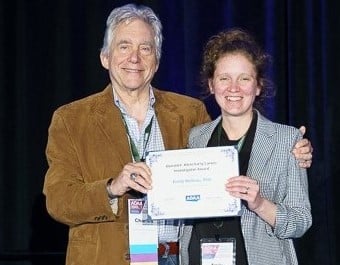ADAA offers an annual award to an early career investigator for the best original research paper on neurobiology, psychopharmacology, psychosocial treatments, or experimental psychopathology of anxiety disorders and depression. This award is named for Donald F. Klein, MD (1928-2019), who revolutionized psychiatric thinking through his discovery in the early 1960s that imipramine, a recently developed psychotropic medication, was effective in blocking panic attacks.
Please note that applications for 2025 have now closed.
Please click here to add your name/email to our 2026 Email List
Congratulations to the 2025 Klein Awardees:

Emily M. Becker-Haimes, PhD
Emily M. Becker-Haimes, PhD, is an Assistant Professor at the University of Pennsylvania’s Perelman School of Medicine and the Clinical Director of the Pediatric Anxiety Treatment Center at Hall Mercer (PATCH) program. Her work is dedicated to advancing the equitable reach of evidence-based psychosocial interventions by: (1) studying how to improve current leading treatments to optimize their effectiveness and cultural responsiveness for diverse individuals, and (2) studying how to optimally disseminate and implement these practices beyond the research environment. Her overarching goal is to increase mental health care quality in routine settings to ensure that all those with mental health needs receive effective and evidence-based care, with a particular focus on youth services. Her work centers community partnerships and those historically underrepresented in research studies.
Since receiving her Ph.D. in 2016 from the University of Miami, Dr. Becker-Haimes has conducted research within the Philadelphia community mental health system. She is the PI of an NIH-funded R01 (MH124897) that is validating a causal model of implementation that integrates principles from the theory of planned behavior with organizational science to predict clinician CBT use in Philadelphia community settings and a newly NIH-funded R34 (MH135965) that is integrating principles of behavioral economics into telehealth infrastructure to increase clinician CBT fidelity. She also was the Project Lead for a recently concluded NIH P50 exploratory project (MH127511) conducting a pilot randomized controlled trial of a novel implementation strategy that leverages principles of exposure therapy to increase clinician comfort delivering evidence-based suicide prevention practices. Forthcoming pilot results suggest that integrating exposure therapy targeted to clinicians into training can reduce clinician anxiety about working with patients at-risk for suicide and improve use of gold-standard screening and intervention practices. She also has been a Co-Investigator or Project Director for numerous other NIH-funded grants. Dr. Becker-Haimes has authored over 80 peer-reviewed publications. Her work is funded by the National Institute of Mental Health (NIMH), the International OCD Foundation, and the Pew Charitable Trust. She has received several national awards for her work, including the Future Directions Launch Award from the Journal of Clinical Child and Adolescent Psychology, the Outstanding New Investigator Award from the Society for Implementation Research Collaboration, and the Early Career Psychologist of the Year from the Pennsylvania Psychological Association. Dr. Becker-Haimes is the author of the Resource for Exposures for Anxiety Disordered Youth (READY) Toolkit (www.bravepracticeforkids.com). Clinically, Dr. Becker-Haimes is an expert in the treatment of anxiety and related disorders, particularly for anxious youth with complex comorbidities. She has trained hundreds of clinicians in the application of exposure therapy. Her ongoing clinical practice informs her research endeavors.

Mohammad Sendi, PhD
Dr. Mohammad Sendi is an Assistant Neuroscientist at McLean Hospital and an Instructor in Psychiatry at Harvard Medical School, renowned for his work on neuroimaging biomarkers for PTSD and depression. Holding dual Ph.D. degrees in Biomedical Engineering and Electrical and Computer Engineering from Georgia Tech and Emory University, Dr. Sendi conducts innovative research that merges functional MRI (fMRI), structural MRI (sMRI), and genetic data to enhance neuropsychiatric treatments. He has made significant contributions by developing machine learning models to discover biomarkers from brain network dynamics. His pivotal research on deep brain stimulation (DBS) in depression, which has the potential to revolutionize DBS therapies, was featured in Science Magazine. At McLean Hospital and Harvard Medical School, he investigates dynamic functional network connectivity and polygenic risk scores with the aim of predicting PTSD severity and advancing personalized treatment paradigms in neuropsychiatry. As the chair of the Genetics and Neuroscience Special Interest Group at the Anxiety and Depression Association of America (ADAA), Dr. Sendi demonstrates his commitment to integrating neuroimaging and genetic data to advance neuropsychiatric therapies. Collaborating with colleagues who focus on the genetic foundations of mental disorders enriches his work on genetic and brain biomarkers at McLean Hospital and Harvard Medical School. Dr. Sendi aims to improve the treatment of complex psychiatric conditions through interdisciplinary collaboration.
The Donald F. Klein award is presented at ADAA's Annual Conference. This opportunity is open to members and nonmembers. Have a question email [email protected].
Please note that the Klein award does not provide a travel or hotel allowance. ADAA strongly suggests awardees book their stay at the conference hotel.
Thank you to our 2025 Klein Award Reviewers: Charles B. Nemeroff, MD, PhD and Alicia Meuret, PhD
- 2024 Awardee: Kristin Zhuhany, PhD
- 2023 Awardee: Emily Belleau, PhD
- View the 2022 Awardee Research Feature Webinar: Sage Hawn, PhD
- View the 2021 Awardee and Runner-Up Research Feature Webinars: Annmarie MacNamara, PhD and Hilary Weingarden, PhD
- Meet the 2010-2024 Klein Awardees
Award Components + −
- Complimentary registration to the ADAA Annual Conference (a $500 value)
- A $500 cash award
- Complimentary two year ADAA annual membership (up to a $578 value)
- Research paper will be automatically considered for acceptance in ADAA’s online scientific journal published by Elsevier - The Journal of Mood & Anxiety Disorders,TM and the article processing charge of $2,700 will be waived.
- Award presented at the Annual Conference Award Ceremony on Saturday.
- Opportunity to present research as a poster at the ADAA Annual Conference.
- Featured profile on the ADAA website
Award Eligibility + −
- Restricted to investigators who have completed their terminal degree and are currently at a rank of assistant professor or below.
- Individuals who are working to complete their degree are not eligible.
- Willingness to host a professional webinar (recorded or live) within six months of winning the award on the research topic of the paper.
- Must be first or senior author on the submitted paper, which must be original research on anxiety disorders, depression, and comorbid related disorders, focusing on neurobiology, psychosocial treatments, or experimental psychopathology.
- The paper cannot be submitted or under review anywhere else from submission until notification about the award (including ADAA's Journal).
- ADAA recognizes, supports, and values the inclusion of diverse groups, educational backgrounds, and views and encourages award applications from minority groups. ADAA also encourages interdisciplinary as well as international applicants.
- ADAA Board Members and Scientific Council members are not eligible.
Please note: A Klein awardee, if they choose, can participate in the entire CDLP program. To participate in the CDLP program (held on the Thursday of every ADAA annual conference), the Klein awardee must register for the conference. The conference registration fee is waived.
Application Requirements + −
- Headshot, biosketch, CV
- Research Manuscript (include abstract, no page limit)
- Letter of Reference from a previous or current mentor/advisor
About Donald F. Klein + −
This award is named for Donald F. Klein, MD (1928-2019), who revolutionized psychiatric thinking through his discovery in the early 1960s that imipramine, a recently developed psychotropic medication, was effective in blocking panic attacks. Dr. Klein’s early contribution to the development of the DSM in large part gave birth to the modern branch of medical science dealing with the classification of disease of anxiety disorders. His early findings also heralded in the era of childhood anxiety disorders as biochemical disorders when he discovered that imipramine blocked childhood separation anxiety disorders.
In later years, Dr. Klein developed a compelling evolutionary-based hypothesis accounting for the etiology of panic disorders, which he terms “the false suffocation alarm theory of panic disorders.” His work remains relevant and topical to the present. Dr. Klein was the recipient of the 2005 ADAA Lifetime Achievement Award.






